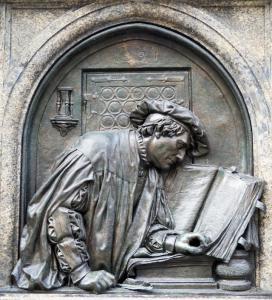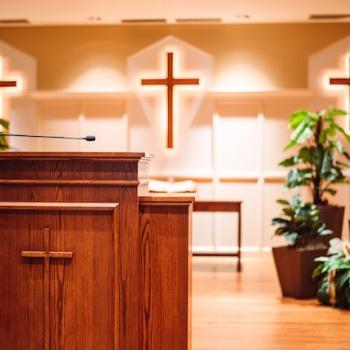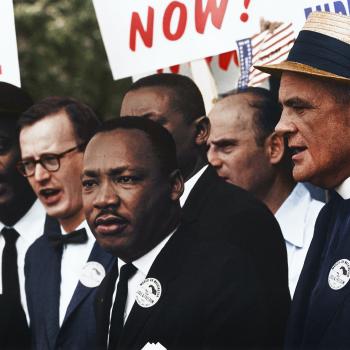If we—as Christians often do—ever think we have all the right answers about the Bible, a look at historical abuses of scripture may give us pause.
That has certainly been the case for me.
What makes reading the Bible a complex thing is not just that translation is complicated and often ambiguous. And it’s not just that both New Testament writers and historical theologians alike often read scripture very differently from the way many modern-day Christians do.
It’s also that lots and lots of people have read the Bible in ways that justify oppression rather than promote love and justice. There have been so many historical abuses of scripture. And these things are worth thinking about as we read the Bible today.
From the Reformation to U.S. Chattel Slavery
I think of the 16th century Protestant Reformation in Europe, and I think of the 17th-19th century system of chattel slavery in the U.S. These are just two time periods and historical circumstances among many times and circumstances where scripture has been used to justify racial and ethnic violence.
In the Reformation era, I think of Martin Luther and his disturbingly violent anti-Jewish rhetoric. Biblically justified, of course.

Are there ways to understand the Bible that do not evoke an anti-Semitic worldview so nasty I don’t even want to quote from it in this post? Absolutely. Why didn’t Martin Luther find these ways? I’m sure the reasons are complex.
But the fact remains that he did not find them. And that should give us pause—knowing that such an influential voice in the formation of Protestant faith read the Bible and came to these conclusions.
In the time of U.S. chattel slavery, similarly influential, prominent, seemingly sincere (white male) theologians seemed to honestly believe that Black people were better off enslaved.
I have no doubt there were insincere people in the mix—bad actors who cared nothing about the Bible but only about their own profit and privilege. But I also have no doubt there were people to whom Christianity was very important, who read their Bibles devoutly, and who were pro-slavery.
This, too, should give us pause.
Does the Bible Ask for Equality?
From Marc Lamont Hill and Todd Brewster’s 2022 book Seen and Unseen: Technology, Social Media, and the Fight for Racial Justice, I learned that Woodrow Wilson’s father, Joseph Wilson, was a southern minister, Confederate army chaplain, and enslaver.
A couple of choice Joseph Wilson quotes (from Seen and Unseen p. 121):
- The Bible “completely…brings human slavery underneath the sanction of divine authority.”
- The Bible doesn’t “ask for equality, but rather repudiates it, seeing that the best interests of all parties can be served only on the terms which nature and providence and scripture have fixed—the terms of mastery on the one side and servitude on the other.”
This wasn’t an unusual sentiment. And it wasn’t an unusual sentiment from people who had spent quite a bit of time reading the Bible, who had devoted their lives to Christian ministry.
Does the Bible ask for equality? Apparently, it depends who you talk to.
Personally, I’m with those who would say, yes, the God revealed in scripture through Jesus is all about equality. All about honoring the dignity of each person created in God’s image. All about liberation.
Historical Abuses of Scripture
When I say that these historical realities should give us pause, I don’t mean to say that we shouldn’t read the Bible. Or that we shouldn’t value what the Bible has to say.
I do think, though, that knowing these things has changed the way I read the Bible. Before I learned of some of these disturbing histories—and maybe it isn’t surprising that I didn’t learn much about them before seminary, because there are plenty of churches that ignore the unflattering parts of the Christian past—I was much more hesitant to disagree with religious authority figures’ interpretations of the Bible.
I hesitated to take stances different from those of the people I knew who seemed wise. Who had been kind to me. Who sincerely wanted to follow God. Who read their Bibles regularly and tried to do what the Bible said.
I used to be more inclined to give church leaders who said things that didn’t feel right to me the benefit of the doubt. I was also more inclined to think we could agree to disagree and still remain in nice church-y communion with one another, in a semblance of unity.
But knowing about the violence against Jewish people, against Black people (just as two examples)—and the way scripture was read to justify it—changes things. What “unity” means changes. What reading scripture looks like changes.
Present-day well-intentioned, biblically-knowledgeable, authoritative-sounding religious people can be just as wrong today as they were two centuries ago, or five.
It is not enough to read the Bible and sincerely want to follow it. That was not enough for Luther, or Joseph Wilson, or any of the other anti-Semites or white supporters of slavery. And it is not enough for us today.
Not On the Side of the Enslavers or Anti-Semites
Knowing some of this history, I come to the Bible with different questions, now. A bias toward love and justice becomes all the more important.
I approach scripture with questions like these:
- What kinds of interpretations of this passage would give credence to the anti-Semite? To the enslaver or the supporter of slavery?
- What kinds of interpretations work against justice and equity, and what kinds of interpretations promote these things?
- How do people who are historically or currently oppressed by dominant forms of Christianity read this passage? What might they see that I don’t?
I want to read scripture alongside people who are oppressed and marginalized in churches and/or our society as a whole. I try to read commentaries and reflections written by Jewish thinkers, Black thinkers, and BIPOC thinkers in general, especially those who are women and/or LGBTQ+.
I want to read scripture in ways that line up more with the experience of oppressed people longing for liberation and less with the oppressors. I want scripture to shape me in this direction.
I want to be open to being wrong, open to change. Always re-forming.
Learning more about the ways scripture has been abused in Christian history helps me be more mindful of the ways scripture is abused today. If it’s not for love and justice, I’m not for it.
This is a choice we get to make: Do we read scripture on the side of the oppressors, or the oppressed? I hope the choice is clear.












